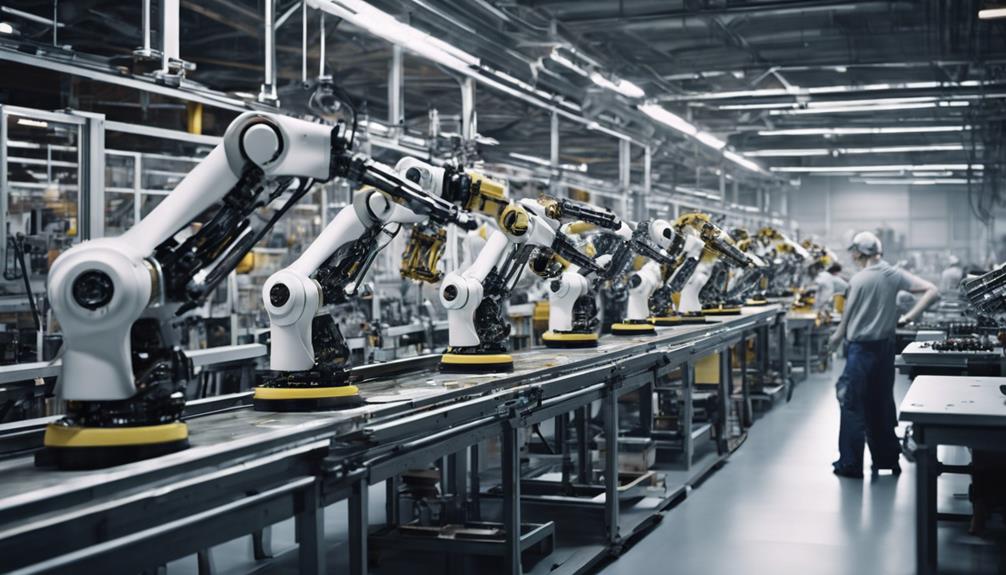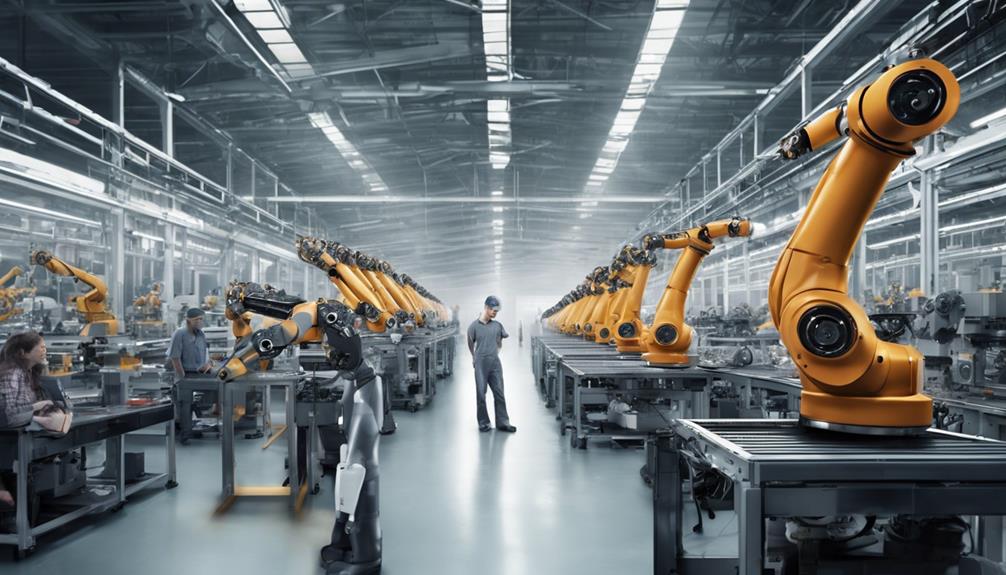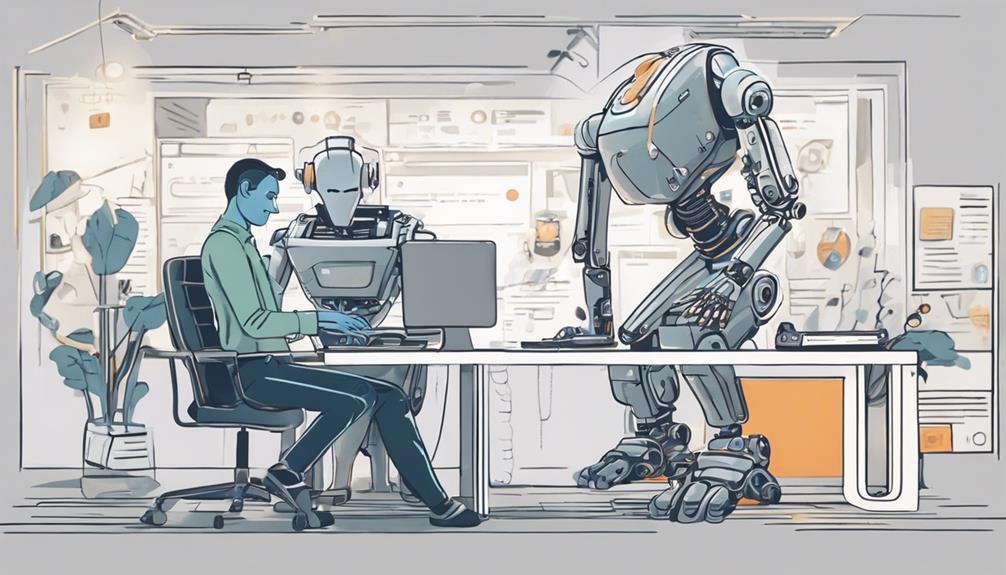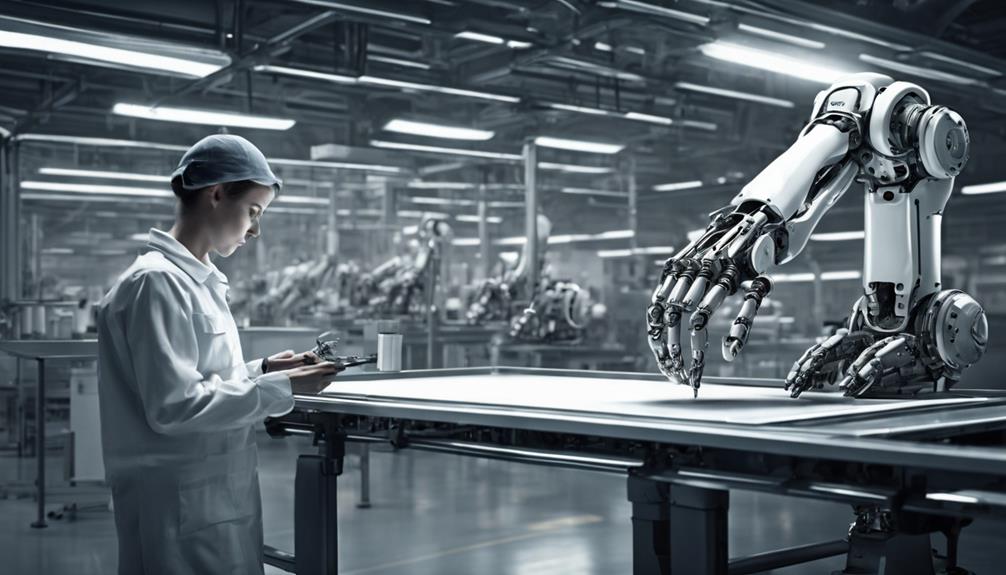As the development of artificial intelligence progresses, its incorporation into the workforce is transforming conventional employment positions in a variety of sectors.
The guide on 'How AI Is Replacing Humans in the Workforce' offers insights into the evolving landscape where AI is automating tasks previously performed by humans.
The implications of this shift are profound, raising questions about the future of work and the necessary adaptations for individuals and organizations.
Understanding the nuances of this transformation is crucial for navigating the complexities of an AI-driven economy, where strategic preparation and upskilling are key to thriving in the changing job market.
Key Takeaways
- AI is automating tasks, replacing human workers in various industries.
- Traditional job roles like customer service reps and drivers are being substituted by AI.
- AI enhances efficiency, streamlines operations, and creates new job opportunities.
- To prepare, develop skills in data analysis, machine learning, and collaborate with AI systems.
Impact of AI on Various Industries
The pervasive integration of AI technology across various industries is fundamentally reshaping the traditional landscape of workforce dynamics and operational functionalities. AI's ability to automate repetitive tasks has led to a shift in the demand for human workers in industries such as manufacturing, healthcare, agriculture, and industrial sectors. As AI continues to advance, jobs traditionally performed by humans are being replaced, leading to disruptions in hiring practices and impacting job roles globally.
Jobs AI Is Replacing

Experiencing a profound transformation, the workforce landscape is witnessing AI's rapid replacement of key job roles across various industries. Customer service representatives are being replaced by AI-powered chatbots and automation tools, streamlining interactions and reducing the need for human intervention.
Moreover, the rise of autonomous vehicles is diminishing the necessity for human drivers, leading to job losses in the transportation sector. Generative AI, such as ChatGPT, is causing concerns as it automates coding tasks, potentially impacting the role of computer programmers.
Data analytics tools are increasingly performing tasks traditionally handled by research analysts, jeopardizing jobs in market and financial analysis. Administrative tasks and data processing are also being revolutionized by AI, affecting professions like paralegals.
As AI continues to excel in automating repetitive tasks and handling complex operations, the demand for human intervention in these areas diminishes, resulting in job loss across industries, particularly in contact centers and administrative roles.
Benefits of AI in the Workplace
Embracing AI technologies in the workplace offers a multitude of advantages that significantly enhance operational efficiency and productivity. AI's ability to automate repetitive tasks streamlines operations, freeing up valuable time for employees to focus on more complex and strategic endeavors. Additionally, AI tools such as chatbots play a pivotal role in enhancing customer service interactions by providing instant support and personalized assistance.
Moreover, AI optimizes marketing strategies by analyzing vast amounts of data to tailor content for better engagement and conversion rates. In the realm of decision-making, AI provides valuable insights through data analysis, aiding businesses in making informed and data-driven choices.
Furthermore, the integration of AI technology creates new job opportunities in AI system development and maintenance, fostering growth and innovation within organizations. By leveraging AI, businesses can not only improve efficiency and customer service but also unlock new job prospects in the ever-evolving landscape of technology and automation.
How to Prepare for AI

How can individuals strategically equip themselves with AI-driven skills to proactively adapt to the changing landscape of the workforce? To prepare for AI, investing in acquiring skills such as machine learning and data analysis is crucial. Enrolling in online courses or training programs focused on AI technologies can provide valuable knowledge about the latest trends and advancements in the field. It is essential to seek opportunities to collaborate with AI systems in your current role to gain practical experience and enhance your skill set. Networking with professionals in AI-related fields can offer insights into potential job opportunities and provide guidance on how to transition into AI-driven roles effectively.
| Strategies to Prepare for AI | Benefits |
|---|---|
| Invest in AI-driven skills such as machine learning and data analysis | Stay competitive in the workforce |
| Enroll in online courses focused on AI technologies | Gain knowledge about the latest trends |
| Collaborate with AI systems in your current role | Gain practical experience |
| Network with professionals in AI-related fields | Learn about potential job opportunities |
Skills for the AI Era
In the rapidly evolving landscape of the workforce, proficiency in data analysis, machine learning, and programming has become indispensable for success in the AI era. As Artificial Intelligence (AI) systems continue to advance, the demand for individuals with the right skills is on the rise.
To thrive in AI-driven roles, professionals must possess expertise in areas such as natural language processing and computer vision, enabling them to develop and implement AI solutions effectively. Understanding algorithms, statistics, and cloud computing is essential for harnessing the full potential of AI technologies in various industries.
Moreover, soft skills like critical thinking, problem-solving, and adaptability play a crucial role in complementing technical AI skills, allowing individuals to navigate complex AI projects successfully.
- Proficiency in natural language processing and computer vision
- Understanding of algorithms, statistics, and cloud computing
- Blend of technical AI skills with soft skills like critical thinking and adaptability
Frequently Asked Questions
How Will AI Affect the Human Workforce?
AI's impact on the workforce is profound, reshaping industries and roles. Automation, chatbots, and autonomous vehicles are reducing the need for human involvement in customer service, driving, programming, research, and legal support, leading to significant job displacement.
Is AI Going to Replace IT Workers?
In the realm of IT, AI is augmenting rather than replacing workers. With a focus on enhancing productivity, IT professionals are leveraging AI tools to streamline tasks, allowing them to concentrate on higher-value activities like strategic planning and complex problem-solving.
How AI Is Transforming the Workforce?
AI is transforming the workforce by automating routine tasks, improving efficiency, and creating new job roles in AI system development. This shift necessitates upskilling to adapt to emerging technological demands and redefining traditional job structures.
What Jobs Are Most Likely to Be Replaced by Ai?
In a rapidly evolving landscape, roles most susceptible to AI displacement encompass customer service, driving, programming, research analysis, and paralegal work. The integration of automation and AI technologies continues to reshape traditional job functions, emphasizing the need for upskilling and adaptability.
Conclusion
In conclusion, as artificial intelligence continues to replace humans in the workforce, it is essential for individuals to adapt and acquire the necessary skills for the AI era.
One interesting statistic to note is that by 2025, it is projected that AI will eliminate 85 million jobs but also create 97 million new roles, showcasing the shift in job opportunities brought about by AI integration.
It is crucial for workers to embrace this change and prepare for the future of work.









